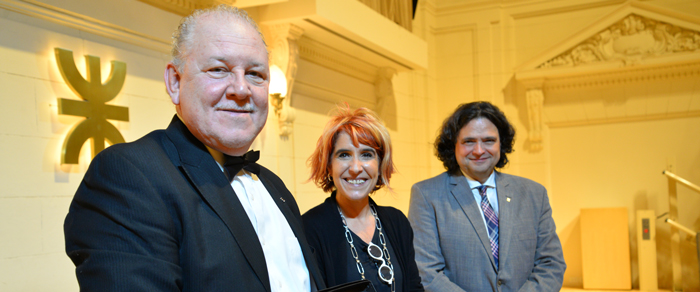UTNBA recognized PhD Armentano for his trajectory in research
His findings as a researcher in the area of engineering applied to the understanding of the cardiovascular system earned him recognition as the 2019 Latin America Eminent Engineer granted by the IEEE.

UTN Buenos Aires awarded a recognition for scientific academic trajectory to Dr. Ricardo Armentano, Director of the PhD in Engineering with a Specialization in Signal and Image Processing and of the Bioengineering Research and Development Group (GIBIO in Spanish).
Eng. Guillermo Oliveto, the School’s Dean; Lic. Patricia Cibeira, the Science, Technology and Productive Innovation Secretary; and Eng. Marcelo Doallo, Director of the Electronics Engineering Department attended the event.
The Dean addressed the attendees with welcoming words and emphasized that “this is an unusual and transcedental event because one of the members of our family, our community, has been granted an award by the Institute of Electrical and Electronics Engineers (IEEE). Beyond that, I’ve known him since many years ago, I’ve seen him constantly pursuing academic excellence. And he has achieved it, both in his work as a teacher, as a Board of Trustees member and as a researcher, but above all, as a trainer.”
Oliveto recalled that when he took office as Dean, the PhD program now directed by Dr. Armentano had been relegated and had scarce resources available, but he committed himself to change that situation.
“This was done with the important collaboration of Marcelo Giura, who at that time was the School’s Academic Secretary, and Florencia Pollo, from the area of Graduate degree programs. We started to work and Ricardo (Armentano) continued pursuing excellence so he proposed to accredit the PhD degree program. At that time, we refused because we came from years of relegation. But he asked us to trust because accreditation would also help us learn. And the truth is that we had the pride of accrediting with the highest qualification,” he stated.
The Dean also said “we have the duty to honor and recognize those guiding the path, and Ricardo is a person who undoubtedly guides the path.”
Then, Eng. Marcelo Doallo congratulated the UTNBA authorities for the recognition and considered that the Eminent Engineer Award granted by IEEE to Dr. Armentano “is like reaching the peak of a mountain: you can see the path travelled, enjoy the achievement, but you can also see other peaks, another challenge. Then may all this serve as motivation to face another challenge.”
The Director of the Electronics Engineering Department added that “Ricardo’s trajectory, his work and Leandro’s, are for me worthy of admiration and I hope that the School’s students take them as examples to follow.”
Dr. Leandro Cymberknop, GIBIO’s coordinator, stressed that during the process of nomination, those who were asked to evaluate and recommend him to be granted the award, were willing to do so.
Cymberknop said that one of Dr. Armentano’s most outstanding characteristics is his capacity for innovation: “for me it’s a satisfaction, a pride and a dream come true to be part of GIBIO. Ricardo always comes up with new ideas, we don’t get bored. We always have something new to do. He’s got a particular vision for everything, he’s open to listen, to help, to look for a solution for everything. He is always willing to get things right. He’s a great conciliator, he never bets on rupture but on union.”
The event ended with a masterful talk given by Dr. Armentano, titled “Innovation by hybridization: The creative mixture challenging human complexity”.
At the beginning of his talk, Armentano stressed that “preparing this, which expresses my huge gratitude, I read a countless number of self-help books. There it reads that, instead of being loved, the most important thing is to love, to reach a state of wellbeing.”
“I am really touched by everything that is happening,” he continued. Especially because this institution, like a mother, sheltered me in such a difficult phase as adolescence.”
The researcher stated that “we have to give our students a versatile but solid education that allows them to work in unsuspected fields. I would have never imagined that I was going to work on what I work on today. Hybridization consists of this: if we gather people of the same discipline together to work, we add up knowledge. But if we get people who work on diverse fields together, the probabilities that such work will be innovative are multiplied. If they work on the same field, they add up, if they work on diverse areas, they multiply. We have to train hybridizers.”



